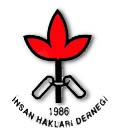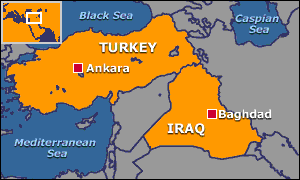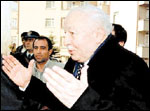1
August 2001
![]()
2. "HADEP moving forward step by step", following the opening of party offices in the Kovancilar district of Elazig and the Kocasinan district of Kayseri last week, HADEP continued to grow with new offices in the townships of Yapali and Yeniceoba in Konya's Cihanbeyli district this week.
3. "European rights court backs Turkey over Islamist party ban", the European Court of Human Rights backed the Turkish government on Tuesday, ruling that its decision to outlaw the Islamist Welfare Party did not violate human rights.
4. "Iraqi- Turkish trade exchange volume is in increase", the Turkish minister of state Tonja Toskai said that the infrastructure for the return of the economic relations volume of his country with Iraq as it was before the year 1990 has become ready.
5. "Turkey Islamists shocked by party ban", islamists in Turkey have been angered by a European Court of Human Rights decision to uphold Ankara's ban on an Islamist political party in 1998.
1. - AFP - "Turkish rights group claims Kurdish villages evacuated by force":
DIYARBAKIR
Turkish security forces have evacuated two villages in the country's
mainly Kurdish southeast by force and banned free movement in three
others, Turkey's main human rights watchdog said Tuesday. The Turkish
Human Rights Assocation (IHD) said in a statement that the Asat and
Ortakli villages in Sirnak province were evacuated last Thursday after
nearly two months of harassment by the local paramilitary police.
"Some 250 people, all residents of the evacuated villages, are now waiting helplessly in (nearby) Beytussebap," which lies close to the Iraqi border, the IHD statement said. Authorities had also banned all entrances and exits from the villages of Ulucak, Dagalti and Hisarkapi, and were threatening the residents with evacuation. The IHD said that the clampdown came in the first week of June when paramilitary troops raided the five villages, holding the villagers responsible for a mine blast, which killed one soldier and injured ten others. "A total of 33 villagers were detained, questioned for days at the local police headquarters and subjected to torture and inhumane treatment," the statement said. It added that three of the detained were raped with truncheons, given electric shocks, forced to stand under scorching sun and had nails driven through their hands. The men, whose health had considerably deteriorated, were currently being held in Beytussebap prison with 23 other villagers.
The IHD added that its appeals to local authorities as well as the interior ministry and the parliamentary human rights commission had gone unheeded. The forced evacuation of and movement ban imposed on villages was due to the "attitude of those who made it a habit to do evil unto its own citizens", the IHD charged. It called for the immediate lifting of the ban, permission for the villagers to return to their homes and sanctions against officials blamed for torture. Turkey's southeast was the theatre for 15 years of heavy fighting between government troops and rebels of the Kurdistan Workers Party (PKK) who took up arms against Ankara in 1984 for Kurdish self-rule in the region. The conflict, which led to allegations of gross human rights violations on both sides including the forced evacuation and torching of villages, has claimed more than 36,000 lives.
Fighting has scaled down since since September 1999, when
jailed PKK leader Abdullah Ocalan urged his militants to abandon their
armed campaign to seek a peaceful resolution to the Kurdish conflict.
But the powerful Turkish military has dismissed the peace bid as a ploy,
insisting that the rebels should either surrender or face the army.
![]()
2. - Ozgur Politika - "HADEP moving forward step by step":
Following the opening of party offices in the Kovancilar district of Elazig and the Kocasinan district of Kayseri last week, HADEP continued to grow with new offices in the townships of Yapali and Yeniceoba in Konya's Cihanbeyli district this week.
ALI SEZGIN
The People's Democracy Party (HADEP) continues to spread and organize
throughout the country. The party opened new district offices in Kovancilar,
in Elazig province, and in Kocasinan, in Kayseri province, last week,
followed by Konya, Eskisehir, and Kirsehir.
As the result of activities lasting about a month, the new HADEP offices in the townships of Yapali and Yeniceoba in Konya's Cihanbeyli district were held this week. Women in particular showed great interest in the grand opening of the headquarters at Yapali, which was attended by about 700 people. The HADEP convoy then moved on to the township of Yeniceoba, where it was greeted enthusiastically by the people. It was reported that the Gendarmerie broke up the crowd of youths which had gathered in front of the town hall before the opening. After the convoy arrived, the people gathered once again and greeted the HADEP officials with zurnas and davuls (traditional wind instrument and drum). The new HADEP township organization also gave a dinner for the people who attended the grand opening. The crowds at both grand opening chanted slogans calling for missing HADEP administrators Deniz and Tanis to be found, as well as shouting, "Neither denial nor division; A Democratic Republic" and "Greetings, greetings, a thousand greetings to Imrali", "Biji A?iti, Biji HADEP" (Long live peace, long live HADEP) and "No to capital punishment; Peace Now."
New branches on the way
Meanwhile, work is continuing to open more new local HADEP headquarters. New offices are planned to be opened within a few months in Eregli (Konya), Aksehir, Yunak, Tavsancali (Kulu), Golyazi (Karacadag), and Bulduk (Cihanbeyli).
Culture festival for children
A mini culture festival entitled "The health of peace" was held by the HADEP Batman Provincial Children's Unit the other day at the central provincial headquarter. "Children's rights" were explained to the children at the festival. A great many children attended the festival and had much fun. Along with talks about international rights of children, there were theater, poetry and folklore presentations. The children were all given gifts at the end of the festival.
500 new members
Meanwhile, HADEP's membership drive that was begun by
central party headquarters and continues concentrated in Istanbul, is
continuing strongly. 500 new members joined the party in the Gaziosmanpasa
district of Istanbul the other day, mainly coming from the Republican
People's Party (CHP), the Freedom and Solidarity Party (ODP), and the
defunct Fazilet Party. Among the new members are former district administrators
of the aforementioned parties. ![]()
3. - AFP - "European rights court backs Turkey over Islamist party ban":
STRASBOURG
The European Court of Human Rights backed the Turkish government
on Tuesday, ruling that its decision to outlaw the Islamist Welfare
Party did not violate human rights. It was a rare victory for Ankara,
which has been condemned by the human rights court at least 11 times
since 1998 for violations of the freedom of expression. By a vote of
four to three, the European judges ruled that the January 1998 ban on
the Welfare, or Refah, party of former prime minister Necmettin Erbakan
could be considered a reasonable action to protect Turkish democracy.
The court said that Turkey had not violated article 11 of the European convention on human rights, covering freedom of assembly and association, as claimed by the party founders. Instead, it underscored that some of the values advocated by Welfare Party leaders, such as planning to introduce Islamic law and legitimising a holy war to achieve religious ends, were not compatible with the European rights convention. The judges backed the Turkish government, for whom Islamic Sharia law "is the antithesis of democracy" dictated by religion with unwavering values. "We willingly accept the government's argument concerning the vital importance of secularism in Turkish society," the only state, according to the court "to have an essentially Muslim population and adhere to principles of liberal democracy." In Ankara, members of the defunct party immediately described the ruling as unfair, adding that they would decide in the next three months whether to appeal the decision.
"This is a double standard and a political decision," said Mehmet Bekaroglu, deputy leader of the newly-established pro-Islamic Saadet -- or Felicity -- Party. The ruling showed that the "European Convention of Human Rights is valid only for certain countries", Anatolia news agency quoted him as saying. Representing the banned party, lawyer Laurent Hincker said "the court ruling raises a worrying question of principle for the necessity of secularism for democracy." "This decision creates a rift with three previous condemnations of Turkey for banning parties," he added, insisting that the activities of the Welfare party were in accordance with the Turkish constitution. "The court has condemned a democratically elected party which had existed for 13 years and which had got into power: that poses a very serious problem," he added.
The party had nothing to do with Sharia law, he said, after the court said that implementation of Islamic law was incompatible with the human rights convention. The court also ruled that the Welfare party had raised doubts about its position regarding the use of force to achieve and maintain power. A political party whose officials insisted on resorting to violence and which did not respect democratic rights or aimed to destroy them, was not protected by the convention, it said. The court also rejected the claim brought by Erbakan and two former Welfare deputy leaders that their rights against discrimination, freedom of expression, protection of property and right to free elections had been violated. The Welfare party emerged as Turkey's most popular political party after parliamentary elections in 1995 and came to power as part of a conservative coalition in June the following year. But the military, Turkey's self-appointed guards of secularism, began pressuring Erbakan, the Islamist prime minister, who was finally forced to resign after a year in office.
In January 1998, the country's constitutional court outlawed
Welfare for "becoming the centre of activities against the principle
of secularism" and its assets were handed over to the state treasury.
Erbakan, 74, and his two deputies, plaintiffs Kazan and Ahmet Tekdal,
were banned from parliament and from taking part in political activities
for five years. The former prime minister was later banned from politics
for life and sentenced to a year in jail, but he won a partial amnesty
avoiding a prison term. Ankara argued it was justified in dissolving
the party, saying Welfare was using democratic laws and freedoms to
introduce the Sharia. ![]()
4. - Arabic News - "Iraqi- Turkish trade exchange volume is in increase":
The Turkish minister of state Tonja Toskai said that the
infrastructure for the return of the economic relations volume of his
country with Iraq as it was before the year 1990 has become ready.
Meantime, the Iraqi oil minister Amer Rashid indicated that the volume
of commercial exchange between the two countries is USD 2 billion and
will be USD 3 billion very soon.
In statements to the press, the Iraqi minister expressed his optimism over Ankara's rejection of the American pressures concerning the " smart sanctions" project, stressing that his government has started to understand the importance of bilateral relations and the need not to be obliged by pressures of foreign states whose interests are not served because of these relations.
The Iraqi minister explained:" we know that America, Britain and the Zionist forces will try to re-debate this project by various means during the coming months in order to convince the world public opinion. But we will confront that and fail what is called the 'smart sanctions' if it will be published through the UN Security Council or not." The Iraqi minister also stressed the need of expanding and verifying trade relations between Turkey and Iraq. He concentrated on the project of installing a gas pipeline from Karkouk to the southern east of Turkey to be linked in future to the European line which will provide the European Union in the year 2010 by natural gas.
Rashid said that he hoped that political relations will be strengthened between the two countries and contribute to bringing together view points to solve their political problems.
The visit of the Iraqi oil minister to Ankara came despite
the rejection of the US and its warning to Turkey over expanding its
trade relations with Baghdad. ![]()
5. - BBC - "Turkey Islamists shocked by party ban":
Islamists in Turkey have been angered by a European Court
of Human Rights decision to uphold Ankara's ban on an Islamist political
party in 1998. 
Turkey did not violate human rights when it banned the Welfare Party,
the European court ruled on Tuesday.
"Europe has trampled on its own principles," said Seref Malkoc, a former Welfare Party lawmaker, referring to Europe's standard of free speech.
The Welfare Party had the largest number of seats in the Turkish parliament when it was shut down, and its leader, Necmettin Erbakan, was a former prime minister.
Surprise decision
The party took its case to the human rights court, claiming that its rights to freedom of assembly and association had been violated.
But human rights judges in Strasbourg decided by four votes to three that the ban had not violated the European Convention on Human Rights.
The newly-formed Felicity Party of the traditionalists in the movement reacted strongly - as did the reformers, who are yet to establish their own party.
The BBC correspondent in Ankara, Firdevs Robinson, said the ruling was as a surprise.
Appeal
A member of the former Welfare Party, Sevket Kazan, who brought the case along with another member, Ahmet Tekdal, and party chairman Erbakan, said he and Mr Tekdal would appeal.
"In the past, the European Court used as a guideline the question of involvement in violence, but now even suspicions are considered enough to close a party," Mr Kazan said.
The decision comes only a month after Turkey's highest court also banned the Welfare Party's de facto successor, the Virtue Party, saying it had become a focus of anti-secular activities.
The court said the Welfare Party ban could "reasonably be considered to meet a pressing social need for the protection of democratic society", as the party had declared its intention to introduce Islamic law.
"They had also left in doubt their position regarding recourse to force in order to come to power, and more particularly to retain power," the judgement added.
The party's political programme had been at odds with the Convention on Human Rights, the judges said, and Turkey had acted reasonably to prevent it being implemented.
Third ban
The decision to ban the party in 1998 for unconstitutional behaviour prompted international criticism that Turkey was acting undemocratically.
It was the third time a party led by Mr Erbakan had been banned: the National Order Party was banned in 1971 after a military coup, and the National Salvation Party was shut down in 1980 - also after a coup.
Ilter Turan, professor of political science at Istanbul's Bilgi University, said this verdict could spell the end to Mr Erbakan's political career.
In the election in December 1995, the Welfare Party had took than 20% of the vote.
Turkey's human rights record is a particularly sensitive issue, as it attempts to join the European Union.
As well as concern over its political bans, the country
has faced strong criticism over its treatment of its Kurdish minority.
![]()